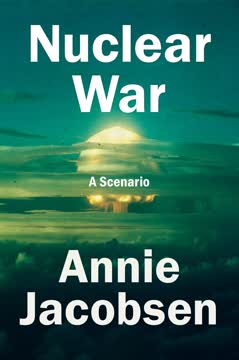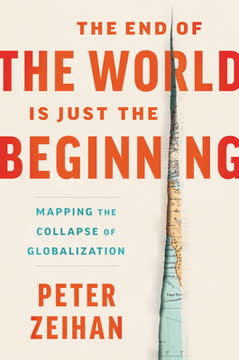Key Takeaways
1. The Fourth Turning: A Recurring Cycle of Crisis and Renewal in History
"History is seasonal, and winter is here."
The saeculum concept. The saeculum, an ancient Etruscan idea, represents a long human life of roughly 80-100 years. This period is divided into four turnings, each lasting about 20-25 years:
- First Turning (High): A period of strong institutions and social conformity
- Second Turning (Awakening): An era of spiritual upheaval and rebellion against institutions
- Third Turning (Unraveling): A time of weakening institutions and strengthening individualism
- Fourth Turning (Crisis): A decisive period that redefines social and political life
Historical patterns. This cycle has repeated throughout Anglo-American history, with notable Fourth Turnings including:
- The War of the Roses (1455-1487)
- The Armada Crisis (1569-1597)
- The Glorious Revolution (1675-1706)
- The American Revolution (1773-1794)
- The Civil War (1860-1865)
- The Great Depression and World War II (1929-1946)
Each Fourth Turning has led to a dramatic reshaping of society, often through conflict and upheaval, but ultimately resulting in renewed institutions and a stronger sense of community.
2. Generational Archetypes: Prophets, Nomads, Heroes, and Artists
"Each generation belongs to one of four archetypes, heroic, artistic, prophetic, and nomadic."
The four archetypes. These recurring generational types play specific roles in the cycle of turnings:
- Prophets: Born during a High, idealistic and values-driven
- Nomads: Born during an Awakening, pragmatic and survival-oriented
- Heroes: Born during an Unraveling, optimistic and team-oriented
- Artists: Born during a Crisis, adaptive and consensus-building
Generational roles in crisis. During a Fourth Turning:
- Prophet elders provide vision and values
- Nomads in midlife offer pragmatic leadership
- Heroes in young adulthood serve as the powerful doers
- Artists in childhood are the protected and later, the sensitive adults who help rebuild
This interplay of generational archetypes drives the dynamics of each turning and shapes the response to crises.
3. The Millennial Crisis: America's Current Fourth Turning
"A Crisis arises in response to sudden threats that previously would have been ignored or deferred, but which are now perceived as dire."
Crisis catalysts. The Millennial Crisis began with the 2008 Global Financial Crisis, followed by:
- Rising political polarization
- Increasing economic inequality
- Growing distrust in institutions
- The COVID-19 pandemic
- Geopolitical tensions, including the Russian invasion of Ukraine
Social mood shift. As the crisis deepens, Americans are experiencing:
- A growing sense of urgency about national problems
- Increasing willingness to support strong collective action
- Rising concern about the future of democracy and national unity
The Millennial Crisis is expected to reach its climax around 2030, potentially resulting in a dramatic reshaping of American society and its global role.
4. Social Transformation During Crisis Eras: From Individualism to Community
"During a Crisis, individuals reattach themselves to their community and turn society outward toward a single and objective goal."
Shift in social priorities. Crisis eras bring about significant changes in social dynamics:
- From individualism to community focus
- From privilege to greater equality
- From defiance to respect for authority
- From short-term thinking to long-term planning
- From irony and cynicism to sincerity and convention
Institutional changes. These shifts in social priorities lead to:
- Strengthening of government and civic institutions
- Increased willingness to sacrifice for the common good
- Greater emphasis on national unity and purpose
- Renewed focus on long-term investments and reforms
This transformation sets the stage for a new social order that emerges after the crisis is resolved.
5. The Role of Generations in Shaping Historical Crises
"Generational aging is what translates the rhythm of the past into the rhythm of the future."
Generational constellation. During the current Fourth Turning:
- Boomers (Prophets) in elderhood: Providing moral leadership and vision
- Generation X (Nomads) in midlife: Offering pragmatic crisis management
- Millennials (Heroes) in young adulthood: Serving as the powerful doers
- Homelanders (Artists) in childhood: Protected and later helping to rebuild
Generational dynamics. Each generation's unique experiences and characteristics shape their response to the crisis:
- Boomers: Idealistic and values-driven, pushing for transformative change
- Gen X: Resilient and adaptable, providing practical leadership
- Millennials: Optimistic and civic-minded, ready for collective action
- Homelanders: Growing up during crisis, developing a cautious worldview
The interplay between these generations will largely determine how the Millennial Crisis unfolds and is ultimately resolved.
6. The Potential Outcomes of the Millennial Crisis: Civil War or Great-Power Conflict
"The risk of catastrophe will be high. The nation could erupt into insurrection or civil conflict, crack up geographically, or succumb to authoritarian rule."
Possible scenarios. The authors outline several potential paths for the Millennial Crisis:
- Civil conflict: Deepening political polarization leads to violent internal strife
- External war: America unites to face a major foreign threat, possibly China or Russia
- Combination: Internal divisions are redrawn in response to external challenges
Factors influencing outcomes:
- Severity of economic challenges
- Degree of political polarization
- Emergence of effective leadership
- Global geopolitical developments
- Technological disruptions
The resolution of the crisis will likely involve significant social upheaval and sacrifice, but could also lead to a renewed and strengthened American society.
7. Preparing for the Climax: The Importance of Leadership and Collective Action
"If there is a war, it is likely to be one of maximum risk and effort—in other words, a total war—precisely because so much will seem to rest on the outcome."
Leadership challenges. As the crisis deepens, effective leadership will be crucial:
- Ability to unite diverse factions towards common goals
- Willingness to make difficult decisions and demand sacrifices
- Vision to guide the nation through transformative change
Collective action. The resolution of the crisis will require:
- Renewed sense of civic duty and national purpose
- Willingness to sacrifice individual interests for collective good
- Mobilization of resources on a massive scale
Potential for renewal. While the climax of the crisis may involve significant hardship, it also offers the opportunity for:
- Addressing long-standing social and economic issues
- Rebuilding and modernizing national infrastructure
- Redefining America's role in the world
- Establishing a new social contract for the post-crisis era
The actions taken during this critical period will shape American society for generations to come.
Last updated:
FAQ
What's The Fourth Turning Is Here about?
- Historical Theory and Cycles: The book presents a theory of history based on generational cycles, suggesting that society moves through four distinct turnings: High, Awakening, Unraveling, and Crisis.
- Generational Archetypes: It introduces four generational archetypes—Prophet, Nomad, Hero, and Artist—that play specific roles during each turning, influencing societal behaviors and attitudes.
- Current Crisis Context: The authors argue that the United States is currently in a Fourth Turning, a period of crisis that will lead to significant societal transformation.
Why should I read The Fourth Turning Is Here?
- Understanding Societal Change: The book provides a framework for understanding the dynamics of societal change and the role of generations in shaping history.
- Predictive Insights: It offers predictions about the future based on historical patterns, which can inform personal and political decision-making.
- Cultural Relevance: The themes discussed are highly relevant in today's context of political polarization and social unrest, making it a timely read.
What are the key takeaways of The Fourth Turning Is Here?
- Cyclical Nature of History: History is cyclical, with societies experiencing predictable phases that influence their development and crises.
- Generational Roles: Each generation has a specific role to play during the turnings, influencing the direction of society.
- Crisis as a Catalyst: Crises are necessary for societal renewal and transformation, leading to a redefinition of values and institutions.
What are the best quotes from The Fourth Turning Is Here and what do they mean?
- “History never looks like history when you are living through it.”: This highlights the difficulty of recognizing historical patterns while experiencing them firsthand.
- “The old American republic is collapsing. And a new American republic, as yet unrecognizable, is under construction.”: This underscores the transformative nature of the current crisis.
- “Every generation revolts against its fathers and makes friends with its grandfathers.”: This reflects the cyclical nature of generational relationships.
How does The Fourth Turning Is Here define the four turnings?
- High: A period of strong institutions and collective confidence, characterized by unity and optimism.
- Awakening: A phase where society questions established norms, leading to cultural renaissance and individualism.
- Unraveling: A decline in social order and trust in institutions, leading to fragmentation and discontent.
- Crisis: A time of upheaval and conflict, where the old order is challenged, leading to renewal.
What generational archetypes does The Fourth Turning Is Here discuss?
- Prophets: Visionaries born during a High, leading during a Crisis with a focus on values.
- Nomads: Pragmatic survivors born during an Awakening, stabilizing forces during a Crisis.
- Heroes: Civic-minded builders coming of age during a Crisis, taking on significant challenges.
- Artists: Sensitive reformers born during a Crisis, emerging as leaders during the following High.
What is the concept of the Fourth Turning in The Fourth Turning Is Here?
- Crisis Phase: Represents a period of crisis following an era of Unraveling, characterized by social upheaval and reevaluation of values.
- Historical Examples: Past Fourth Turnings include the American Civil War and the Great Depression, leading to profound societal changes.
- Future Implications: The current Fourth Turning is expected to culminate in transformative events reshaping the nation.
How does The Fourth Turning Is Here relate to current events?
- Crisis Context: The book connects cyclical patterns to contemporary issues like political polarization and social unrest.
- Generational Response: Each generation must respond to the current crisis in ways that reflect their unique characteristics.
- Historical Lessons: It encourages learning from historical precedents to navigate the current landscape.
What is the significance of the "saeculum" in The Fourth Turning Is Here?
- Definition of Saeculum: A long human life cycle, typically spanning 80-100 years, encompassing multiple generations.
- Cyclical Nature: Divided into four turnings, each lasting about 20-25 years, explaining recurring historical patterns.
- Implications for the Future: Recognizing the saeculum helps anticipate societal shifts and prepare for challenges.
What advice does The Fourth Turning Is Here offer for navigating the Fourth Turning?
- Embrace Change: Accept the inevitability of change during a crisis for personal growth and societal progress.
- Engage with Community: Emphasizes the importance of community and collective action during the Fourth Turning.
- Prepare for Renewal: Focus on the potential for renewal that follows a crisis, contributing positively to society.
How does The Fourth Turning Is Here define the role of leadership during a Fourth Turning?
- Adaptive Leadership: Leaders must be adaptable and responsive to changing societal needs.
- Visionary Guidance: Providing clear vision and direction can inspire collective action and resilience.
- Building Trust: Prioritizing transparency and community engagement is crucial for successful leadership.
What does The Fourth Turning Is Here say about civic duty?
- Collective Responsibility: Civic duty is essential for a functioning society, especially during times of crisis.
- Historical Context: References historical figures to illustrate the importance of civic engagement.
- Future Implications: A renewed sense of civic duty is necessary for emerging successfully from the current crisis.
Review Summary
The Fourth Turning Is Here receives mixed reviews. Many readers find Howe's generational theory and cyclical view of history compelling, praising its insights into current events and potential future outcomes. However, some criticize the book for rehashing content from the original "Fourth Turning" and exhibiting political bias. Readers appreciate the historical analysis but question the accuracy of predictions. Some find the book dense and challenging to read, while others consider it essential for understanding societal patterns and preparing for potential crises.
Similar Books










Download PDF
Download EPUB
.epub digital book format is ideal for reading ebooks on phones, tablets, and e-readers.




